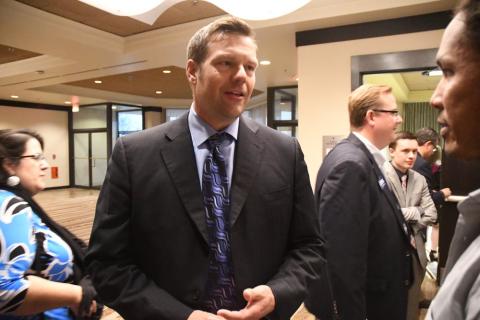Update: After voting discrepancies were discovered, Kris Kobach announced that he will recuse himself from the recount of the GOP gubernatorial primary election. Additionally, sitting Gov. Jeff Colyer, who trails Kobach by a slim margin, sent a letter to Kobach, calling on him to step away from advising local elections officials on the recount.
The letter said:
"It has come to my attention that your office is giving advice to county election officials — as recently as a conference call yesterday — and you are making public statements on national television which are inconsistent with Kansas law and may serve to suppress the vote in the ongoing Kansas primary election process. Accordingly, I hereby request that you recuse yourself from rendering further advice in these matters and that you designated the Attorney General of Kansas to provide this function.”
Kobach's lead over Colyer has narrowed to a mere 91 votes.
Kansas Secretary of State Kris Kobach is in a tight race for the GOP nomination for governor, which is undergoing a recount that was being overseen by... Kris Kobach.
Source: New York Times
Yet despite calls for Kobach to recuse himself (being that it is his race), he initially refused, citing no law that forces him to do so. This is an extraordinary example of why the people in charge of the administration of our elections should be nonpartisan.
There is a clear conflict of interest in this case. Even if Kobach doesn't physically count any votes himself, he is ultimately the top official who oversees the entire process and advises county officials on how to conduct the recount.
However, this conflict of interest goes beyond just Kobach. It would still exist if the secretary of state or other elections officials involved were members of his party. They too have an interest in the race.
How could anyone really trust Kobach or another Republican to be completely unbiased and ensure that the recount process is conducted objectively? How could a Democrat, for that matter, be trusted to call it fairly?
Imagine if it was the Super Bowl, and a game-winning play came down to a review from players who are in the game. Wouldn't make much sense, would it?
The only way to better ensure a fair elections process that voters can trust is to mandate that the people who administer these elections are not members of, have no loyalty to, or invested interest — of any kind — in the parties involved.
Do you agree? Let us know in the comment section below.
Photo Credit: Mark Reinstein / shutterstock.com
